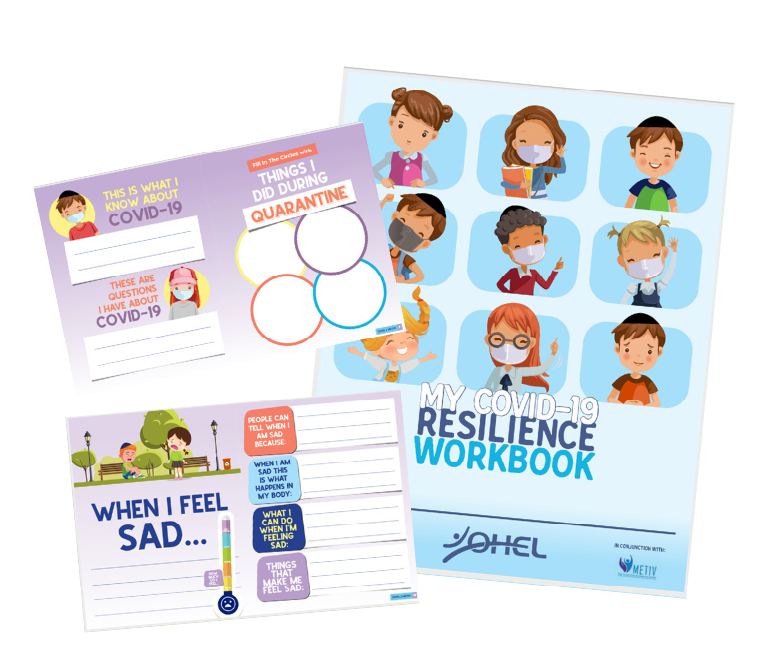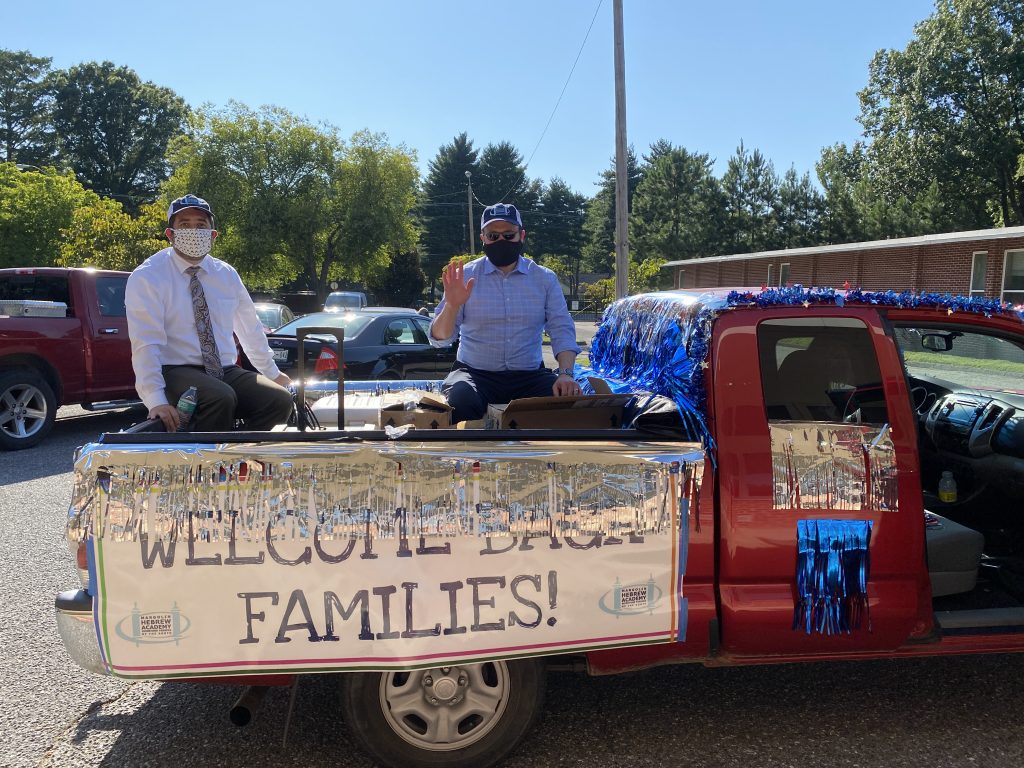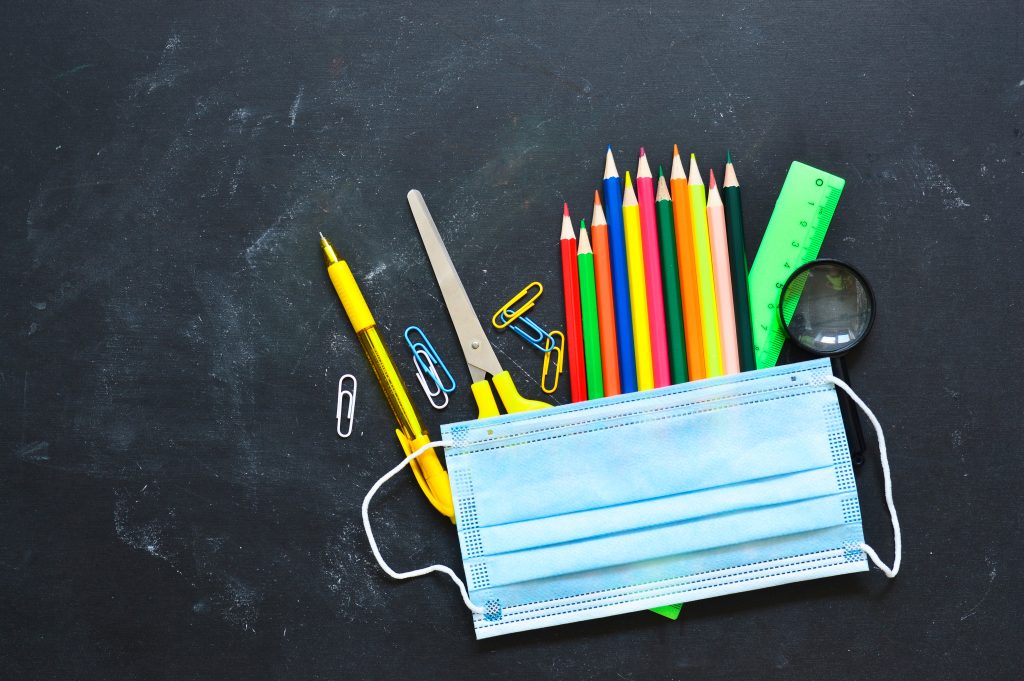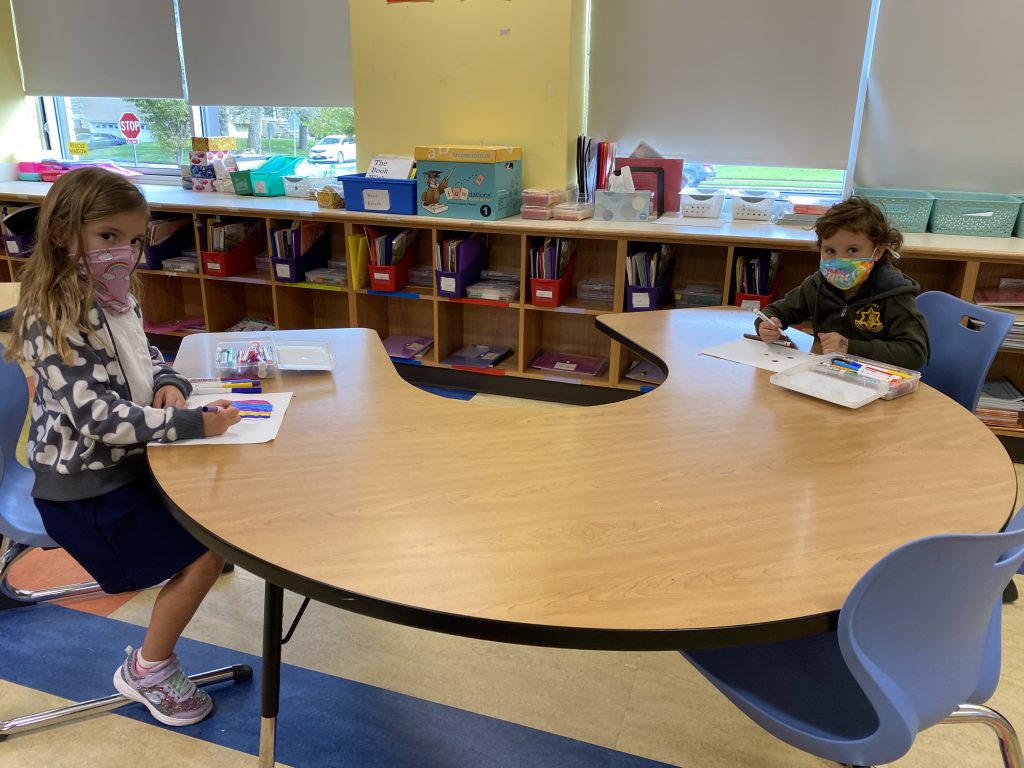The Age of Anxiety
Even before the advent of the coronavirus, too many children were exhibiting signs of anxiety and stress. What are schools doing to promote good mental health in our children in general and to help them cope with the stresses of Covid-19 in particular?
When Rabbi Yitzie Ross, a fourth-grade rebbi at Yeshiva of South Shore in Hewlett, New York, started teaching this past September, he noticed that his students were very restless. “I never had a class lose focus so quickly,” says the veteran rebbi. He generally encourages students to follow along in the siddur with their “fingers on the place” while they daven; during the first weeks of this school year, few were able to do so. In Chumash class, a number of children were distracted and had difficulty paying attention. Rabbi Ross realized that all those months of not being in a school setting caused many students to have a hard time readjusting to the academic rigor of school. “The kids forgot how to sit in their seats and follow rules. They are worlds behind. They have no idea how to behave in a classroom.”
But while the students’ lack of focus didn’t come as a shock to Rabbi Ross, he found the level of their anxiety surprising. A nine-year-old student, seated behind plexiglass and wearing a mask, went through a sixteen-ounce bottle of hand sanitizer in two days after a student coughed near him. “There was real fear in his eyes,” says Rabbi Ross.
For some children, anxiety may be rooted in trauma; they may have experienced the sudden death of a grandparent or other relative, sensed their parents’ financial stress, or been subjected to a chaotic home environment for months on end.
“There are students who returned to school with genuine worries,” says Carly Namdar, an educational psychologist who serves as director of middle school guidance at Hebrew Academy of Long Beach (HALB) on Long Island, New York.
In recent weeks, Jewish day schools in certain zip codes in the tristate area considered “red zones” opened briefly only to shut down again and resume Zoom school, which further contributed to the apprehension students might have already been feeling.
“Kids have lost so much these last few months,” says Tzivy Reiter, a licensed clinical social worker who is the director of children’s services at Ohel Children’s Home and Family Services, a large social service agency in New York City. “They’ve lost skills—social-emotional skills. They’re under duress.”
Reiter herself has become an unintended expert in disaster relief in the last twenty years—she was an active participant in the agency’s post-disaster work in the aftermath of 9/11, Hurricanes Sandy and Harvey, and the Pittsburgh synagogue shooting. But nothing prepared her for the pandemic of 2020. “This is different than anything I’ve seen. Every acute crisis has a beginning, a middle and an end.” In the case of Covid-19, however, the crisis is going on for so long—“there is an open-endedness.”
Additionally, she notes that in many ways the Covid scenario has no rule book. It is unusual, for instance, that the helpers or mental health professionals are affected by the same trauma as those they are helping. “It’s a shared traumatic reality,” she says.
Rise in Anxiety
Even before the onset of the pandemic, however, there was a noticeable rise in anxiety and stress among children and young people. “Anxiety disorders have become more prevalent, complex and severe over the past few years,” says psychologist Dr. David H. Rosmarin, an assistant professor at Harvard Medical School and founder of the Center for Anxiety in New York. “Approximately one third of teens today and one in six primary school–aged children have significant distress or impairment from anxiety symptoms.”
It used to be a stigma if a school had a guidance counselor. Nowadays, the majority of Jewish day schools and yeshivos have at least one mental health professional on staff.
“Everyone agrees that kids are suffering from a higher level of anxiety,” says Rabbi Avi Landa, middle school mashgiach at Talmudical Academy of Baltimore (TA) and counselor at TA’s high school. “They feel stressed trying to stay on top of homework and tests. Principals cannot be referring students to therapists outside of the school en masse,” asserts Rabbi Landa, who has a master’s in counseling psychotherapy from Johns Hopkins University and a license in clinical counseling.
In fact, the rise in anxiety has not gone undetected by Jewish educators. While day schools and yeshivot have traditionally focused on academics way more than on students’ mental health needs, a shift had taken place in the world of Jewish education, long before anyone ever heard of the word Covid.
“It used to be a stigma if a school had a guidance counselor,” says Shira Berkowitz, LCSW, who is based in Chicago and serves as the director of school-based programs for Madraigos Midwest, an organization that supports the emotional, social and spiritual health of adolescents and young adults and program director of Darcheinu and Our Path, two social-emotional learning curricula for Jewish day schools. “Nowadays, the majority of Jewish day schools and yeshivos have at least one mental health professional as part of the school administration. We are way more open as a community to mental health issues, and this has filtered down into the schools.”
Rabbi Binyomin Babad, director of Relief Resources, the New York-based frum referral network for mental health services, says he’s witnessed a growing openness to addressing mental health issues even in the most insular yeshivot. Many of these schools have mental health professionals on staff, though the students may not be aware of the actual role of those staff members. (Some kids won’t speak to a therapist but will confide in a mechanechet [Torah educator] or mashgiach [spiritual advisor].) Relief Resources partners with Torah Umesorah, the National Society for Hebrew Day Schools, to conduct training for mechanchot and yeshivah mashgichim who serve in a quasi-mental health role. “The fact that such a program exists is evidence of how things are changing,” says Rabbi Landa.
Of course, there are still some pockets of resistance. Some schools, says Berkowitz, insist that their students “don’t have issues.” A classroom rebbi recalls that a parent once told him, “I have a rav. My child doesn’t need a counselor.”
But such resistance, says Berkowitz, is far from the norm. “In practically every school, there are at least one or two students out during the year because of mental health conditions.” As a result of the prevalence of mental health issues, “as a community, we have tried to stop sweeping problems under the rug. Frum publications discuss these issues openly.”
Covid has helped move Jewish schools along in this area, making teachers and administrators more aware of and attentive to mental health concerns. “A child is not available for learning if he’s in an unhealthy place,” says Namdar.
Skills for Life
“Social-emotional skills are really skills for life,” says Reiter, who is a firm believer in “universal intervention,” the notion that schools must play a proactive role and provide all students, not only those who seem to be having a hard time, with social-emotional support. With this approach, it’s not just the stereotyped “problem child” who gets support. “All children get some level of support and social-emotional skill building,” says Reiter. “A school with a more progressive, resilience-based environment is going to have this mindset.”
Piggybacking on the national push to have social-emotional learning (SEL) in public schools, some Jewish day schools, in addition to having mental health professionals on staff who meet with students one on one, have begun introducing SEL into the curriculum. In these weekly or biweekly sessions, social-emotional skills, including managing emotions, developing compassion, knowing how to handle conflict, building healthy peer relationships, and responsible decision-making, are taught in a classroom setting.
Studies show that SEL programs not only improve social and emotional skills, they also improve academic performance. Even more importantly, they give kids the keys to future accomplishment. “We believe that social-emotional skills are a greater predictor of academic success and life success than IQ,” says Reiter.
The Darcheinu web site states that students who have completed SEL programs are nine times more likely to report bullying, and fifteen times more likely to prevent bullying. Additionally, their grade point averages are thirteen percentile points higher than those who have not taken SEL programs.
Do the lessons stick? According to Reiter, there’s no question they do. She tells the story of a mother of a young child who participated in Ohel’s Smile Club, a weekly program held over Zoom several months ago when everyone was sheltering in place that helped children develop emotional regulation and problem-solving skills. The mom was having a hard day and looked somewhat down. Her daughter handed her a piece of paper and said with an air of authority, “Mommy, draw how you feel. It will make you feel better.”
Joining the SEL Movement
Aiming to help schools “catch issues before they become problems,” Berkowitz is on a crusade to make SEL an integral part of every Jewish day school curriculum. She has helped bring Darcheinu and Our Path, comprehensive SEL curricula designed for fifth through twelfth grade, to thirty schools nationwide. Schools in London and Melbourne have reached out to her as well.
Berkowitz says the SEL curricula currently used in public schools around the country are not appropriate for Jewish day schools, since many of the topics (teen pregnancy, youth violence and/or criminal behavior) do not relate to the day-to-day lives of average religious students. Berkowitz and her team have therefore customized SEL curricula for Jewish schools—Our Path for Modern Orthodox schools and Darcheinu for more right-wing schools.
The Darcheinu/Our Path curricula, explains Berkowitz, is preventative, addressing issues including bullying, peer pressure, self-esteem and body image, while incorporating Torah principles such as derech eretz (respect for others), hakarat hatov (gratitude), and being same’ach b’chelko (content with what one has), among others. The lessons also draw upon examples of personalities from Tanach when applicable.
“These classes can literally prevent future mental health issues,” states Berkowitz, who has taught the curriculum in various schools since 2003. To illustrate her point, she tells of a class she once gave to teenage girls on the subject of body image. After the class, a girl approached her and said that one of her friends is barely eating and is significantly underweight. Together they figured out a way to guide the young person in question toward help. Berkowitz tells her students that her classroom is a nonjudgmental environment and they can share anything they’d like and she will respect their confidentiality. However, if someone is in danger, confidentiality will have to be broken.
“If students have a good, solid sense of self, they can withstand peer pressure and are less likely to fall into negative behavior patterns,” she explains. “And if they learn how to manage their anxiety, a full-blown anxiety disorder can be prevented.”
“The classes have a direct impact,” says Rabbi Landa, who teaches an SEL-styled course at TA. “I can’t tell you how many boys come to me after class and discuss things they wouldn’t discuss if not for this class.” Rabbi Landa, who worked with Berkowitz on the curriculum, has also created a special course called “The Kedusha Talk” for teaching boys about puberty.

Ohel created materials to help schools re-open this past September in a safe, comfortable way. Courtesy of Tzivy Reiter
Some schools create their own SEL curriculum based on their particular needs. Torah Academy for Girls (TAG) in Far Rockaway, New York, for example, has a team of social workers on staff, each assigned to a different age group, ranging from preschool to high school. Four years ago, Tova Bollag, a licensed social worker, was hired to work specifically with the junior high school students at TAG. “Since they’ve hired me, the mental health team has grown significantly,” she says. Initially, Bollag’s primary role was to work with students one on one; however, she noticed that many of the issues the girls were grappling with centered on social situations. With the support of the TAG administration, Bollag began teaching a course called “Social Thinking” to sixth graders. The TAG mental health staff customized the curriculum, based on the popular book The 7 Habits of Highly Effective Teens by Stephen and Sean Covey, to suit the particular needs of religious girls. The course covers topics such as developing self-awareness, cultivating personal growth, building healthy interpersonal relationships, managing time wisely, creating goals, and working together as a team. “Teaching about mental health issues in the classroom also helps destigmatize these issues,” says Bollag.
Another SEL program currently in use is Ohel’s Road MAPP to Success Program (Middle School Anxiety Prevention Program), which emphasizes giving students “social-emotional language,” explains Reiter. “We give them the language and tools to navigate how they are feeling. This is especially crucial during middle school, when a lot of mental health issues seem to crop up.” In 2018, HALB and Bnos Bais Yaakov in Far Rockaway were the pilot schools for this program, with Ohel providing extensive teacher training. Geared for sixth grade students, the Road MAPP teaches practical skills such as self-talk, mind/body connection, and identifying strengths—all with a focus on resilience, which is at the heart of the curriculum. “Resilience is like a muscle; it can be developed,” explains Reiter.
“It’s the best sixth-grade life skills curriculum I’ve seen,” says Namdar, the director of guidance at HALB’s middle school.
In many ways, teachers this year have to function as social workers. “The same way a rebbi knows if a child’s davening is off, he must be able to pick up if a child is emotionally ‘off,’ and not doing well,” says Rabbi Ross. Cognizant of this, school administrators are offering teacher training in mental health. The well-known psychologist Dr. David Pelcovitz presented a session on recognizing anxiety among children and themselves to educators at the Margolin Hebrew Academy in Memphis, Tennessee. Dr. Talia Hindin, school psychologist at Ben Porat Yosef in New Jersey, says that over the summer there was an optional book club for faculty where they read books including Permission to Feel: Unlocking the Power of Emotions to Help Our Kids, Ourselves, and Our Society Thrive. “We also see the need to support our teachers . . . how do they balance their own emotional health? They have to take care of themselves so they can be there for their students,” says Dr. Hindin.
A Covid Curriculum
Along with collectively spending millions of dollars this past summer on facilities upgrades, additional space, PPE (personal protective equipment) and additional staff due to the Covid crisis, Jewish day schools and yeshivot recognized the need to invest in helping students cope with the challenges of the past few months.
This past September, TAG increased the presence of mental health staff in the classroom, preparing teachers for the potential impact on students. In addition, the mental health professionals on staff helped students process their experiences through creative expression, via journaling or art projects such as collages.

To welcome students back to school, Margolin Hebrew Academy in Memphis, Tennessee sponsored a parade. Courtesy of Jessica Baum/Margolin Hebrew Academy
The Margolin Hebrew Academy took a creative approach to reducing kids’ anxiety as they returned to school: it sponsored a parade. Since the community is located within a relatively small area, head of school Rabbi Benjy Owen and other administrators stood on a flatbed truck, decorated with colorful posters and balloons, and circled the neighborhood. Teachers followed in their cars. As the truck passed each child’s home, the administrators waved and distributed popsicles and frisbees. “We wanted to reduce kids’ anxiety and build some excitement for the start of school,” explains Rabbi Owen.
In the beginning of the school year, Reiter, as the director of Ohel’s school-based programs, became a major force in helping schools prepare for reopening in a safe, emotionally comfortable way. She oversaw the development and dissemination of a school reopening toolkit that included lesson plans for different grades. The lessons take students through various stages in an age-appropriate way, acknowledging the trauma (“What happened to us?”); allowing them to express their feelings (“How do we feel?”); and finally, bringing them emotionally to a place of hope (“Looking forward”). “There must be an acknowledgement of the trauma,” says Reiter. Some 140 schools downloaded the toolkit, made available by Ohel free of charge. Additionally, in conjunction with Metiv: The Israel Psychotrauma Center, Reiter produced a “Resilience Workbook,” an activity book for children in kindergarten through fifth grade that aims to help students build resilience. Based on the latest research on self-regulation, the workbook is comprised of various coloring pages where children learn not only to identify feelings but to understand that feelings “don’t just happen to them, they can regulate those feelings,” explains Reiter.
Many schools are simply drawing upon their existing SEL programs to bolster students’ coping skills and resilience. “Some of the skills we teach in our Road MAPP program include mindfulness, relaxation techniques and self-talk,” says Namdar. The teachers at HALB, she says, are at an advantage since they’ve already received significant training in mental health awareness because of the pilot program. “Our faculty has a strong foundation in adolescent mental health. This is just continuing the conversation.”
Drawing upon the work of positive psychology guru Tal Ben Shahar, Namdar insists that there’s no rule book with regard to how one should be feeling at this time. Her advice for both children and parents? All emotions are okay. Express your emotions. Draw them. Paint them. Write them. Exercise regularly. Have some way to engage in self-care. And finally: Express gratitude. Gratitude research shows that the more gratitude we express in our lives, the happier we are, she says. Keep a gratitude journal, she advises—there is always something to be grateful for.
Ahuva Reich is a freelance writer who lives in New York.
More in this Section:
Are We Coddling Too Much? by Barbara Bensoussan
Parenting the Anxious Child by David H. Rosmarin



